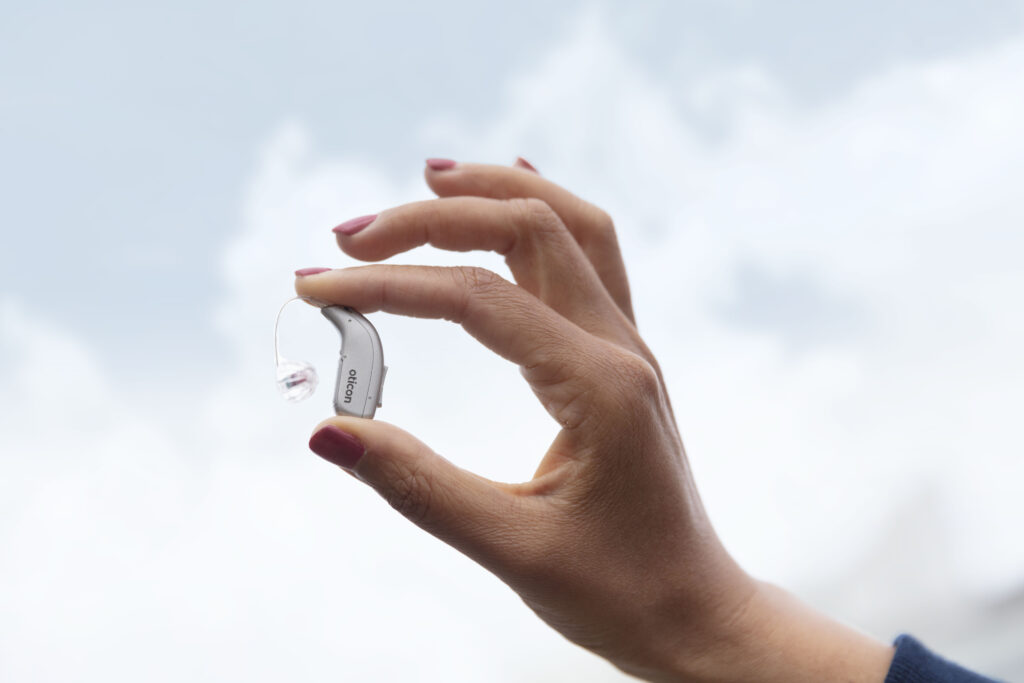
Wearing Effective Hearing Aids Could Reduce Stress.
Oticon bridges the gap between lab and real-world hearing aid research and establishes a link between how changes in sound affect heart rate and the potential for well-fitted hearing aids to reduce stress from noise
Copenhagen, Denmark, March 16, 2021 – Hearing aid manufacturer, Oticon, together with their research centre, Eriksholm, have unveiled new research revealing that hearing aids could reduce the impact that sound, and more specifically noise, has on a person’s stress levels. Providing a glimpse into the future of data-driven hearing aid innovation, the new data collected could one day see well-fitted hearing aids actually being used to help reduce raised heart rate.
As part of its ongoing BrainHearing research programme, which looks at reducing the listening effort of a person with hearing loss, Oticon, at their research centre Eriksholm, is delving deeper than ever before into the world of sound we live in, working on new ways to determine how changes in sound influence health. Its new hearing research includes a study of heart health. Eriksholm has measured pupil dilation to determine stress caused by sounds and the effort of listening, as well as studied heart rate both in the lab and the real-world, the results of which demonstrate the importance of effective hearing aid technology and correct fitting.
The lab study[i] discovered that periods of noise, especially when listening to speech, increase stress and demonstrates that noise reduction from Oticon Opn™ hearing aids delivers quality sound which helps reduce a person’s stress reaction.
Oticon has now broken out of the lab in order to study how real-life sound can impact health[ii]. With access to the logged acoustic data of its internet-connected hearing aids via the Oticon ON app* and continuous mean heart rate in 5-minute intervals from the users’ own wearables, Oticon is able to see how real-world sound exposure affects heart rate and indeed how often a person’s heart rate is increased by sound changes. Oticon’s novel observations to date include that the sound we live in contributes to approximately 4% of the fluctuation in mean heart rate throughout the day. Most prominently, periods with loud sound increase mean heart rate while access to a better sound quality (i.e., a higher signal-to-noise ratio) reduces this stress reaction and lowers mean heart rate, even when the sound is loud. Based on this data, if hearing technology was used to help reduce the impact of unwanted noisy sound and instead enhance the relevant sounds around us, it would contribute towards maintaining heart health every day.
Oticon More™ hearing aids feature advanced noise reduction working in unison with a deep neural network allowing users to hear ALL relevant sounds. This is a completely new way to support hearing loss, breaking with the tradition of directionality technology which fundamentally limits what a hearing aid user can hear at any one time. Oticon More™ enables a user to hear more naturally and also ensures sound is ‘comfortable’ to listen to, creating the perfect conditions to help reduce listening effort and stress, which as per Oticon’s real-world study, would help with heart health in the noisy environments that users face on a daily basis.
“Noise, which essentially is unwanted sound, can be terribly unhealthy”, says Jeppe Høy Christensen, researcher, Eriksholm Research Centre, part of Oticon. “Creating a link between lab studies and user provided research, we can confidently say that by effectively making noise less burdensome by enhancing relevant sounds, through hearing technology we will be able to help improve not only the brain but also the heart health of our hearing aid users. Our research strives to constantly inspire improved hearing aid technology and we are particularly proud to have uncovered such a significant revelation. The consequence could even see manufacturers of other hearing products, such as headphones, employing new technology to benefit their users’ health.”
* Oticon Opn™ users submitted their consent for Oticon to use their anonymized data for research purposes, with specific consent permitting access to their GPS location.
-ENDS-
About Oticon
500 million people worldwide suffer from hearing loss. The majority are over the age of 50 while eight percent are under the age of 18. Oticon’s vision is to create a world where people are no longer limited by hearing loss. A world where hearing aids fit seamlessly into life and help people realise their full potential, while avoiding the health consequences of hearing loss. Oticon develops and manufactures hearing aids for both adults and children and supports every kind of hearing loss from mild to profound and we pride ourselves on developing some of the most innovative hearing aids in the market. Headquartered in Denmark, we are a global company and part of Demant with more than 15,000 employees and revenues of over DKK 14 billion. Changing technology. Changing conventions. Changing lives. Oticon – Life-changing hearing technology. www.oticon.global
Press Contact:
Sarah Chard, The PR Room. Email: sarah.chard@theprroom.co.uk. Phone: +44 (0) 333
9398 296
[i] Wendt, D., Hietkamp, R. K., & Lunner, T. (2017). Impact of noise and noise reduction on processing effort: A pupillometry study. Ear and hearing, 38(6), 690-700. doi: 10.1097/AUD.0000000000000454
[ii] Christensen, J. H., Saunders, G. H., Porsbo, M., & Pontoppidan, N. H. (n.d.). The everyday acoustic environment and its association with human heart rate: Evidence from real-world data logging with hearing aids and wearables. Royal Society Open Science, 8(2), 201345. https://doi.org/10.1098/rsos.201345




